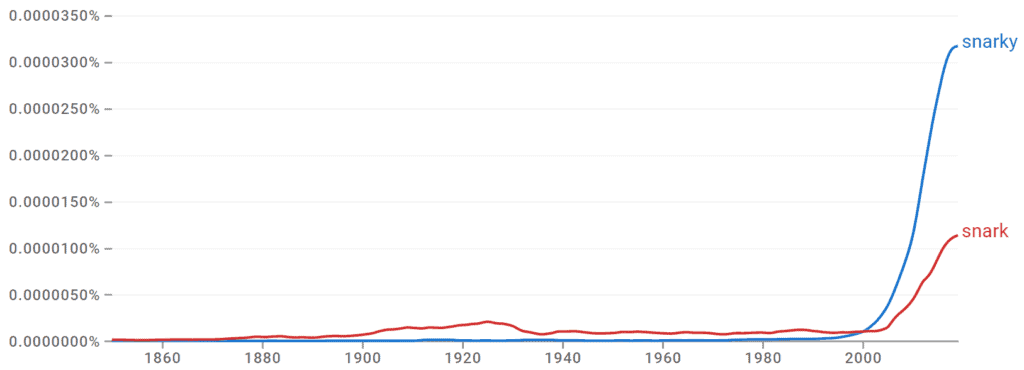Languages are constantly evolving through the addition of new words, alternative definitions and the loss of certain archaic phrases that haven’t passed the test of time. Most new words derive from existing words or phrases and, after a certain amount of time, make their way into everyday language.
Snark is a fairly modern word first attributed to use in the mid-1990s, but it is derived from an older term that reaches back to the start of the 20th century. Let’s learn about its interesting history, misconceptions of origin, and how to use it in modern speech and text.
What Is the Meaning of Snark?

Snark is a noun that means a rude, belittling, or sarcastic remark or attitude. Snark is often sarcastic in nature and is used to criticize, scorn, or mock someone or something.
For example:
- Maybe one day I can understand why every time she opens her mouth, all we hear is snark. Perhaps she truly is projecting, and I should pity her, but all I feel is annoyed at her attitude.
- We thought the survey we shared would provide us with the constructive criticism we needed to move forward with growing our events, but almost all we received was a large amount of snark instead of the information we needed to make positive change.
- The snark between competitive businesses on social media is rather amusing and serves as an unexpected source of advertising due to the number of people who follow the online drama.
Synonyms for Snark
To better understand what snark means, consider these synonyms.
- Cynicism
- Irascibility
- Sarcasm
- Spite
- Scorn
- Irreverence
- Impertinence
- Irritability
What Is a Snarky Word or Snarky Comment?

Snarky is an adjective and has actually been in use for much longer than snark (more on that below).
Snarky means to be acting sharp, snide, spiteful or bad-tempered. As an adjective, snarky describes something as sharp, snide or spiteful in nature. Therefore, you are being snarky to somebody if you make a snarky comment.
For example:
- I could not believe how snarky he was with her; I was almost ready to interrupt their conversation when she finally told him off and walked away.
- Did you have to mention the snarky comment she said behind Sara’s back yesterday? It would have been better to have kept Sara in the dark to avoid hurting her feelings.
Snark has also been used as a verb in some scenarios despite dictionaries having some conflicting examples of this. To use snark as a verb, use it in a manner that describes the action of expressing oneself in a snarky fashion.
For example:
- The two candidates snark at one another over policy rather than discuss solutions.
- New to the stage, the comedian snarked his way through the first 10 minutes before he finally got a laugh; after that, it was smooth sailing.
- Social media has increasingly become a platform for people to snark at one another.
Snark Origins

Before snark was used to describe opinionated, sarcastic and caustic rhetoric, it was actually the name of a fantastical, fictional creature in Lewis Caroll’s poem, The Hunting of the Snark (An Agony in Eight Fits) published in 1876:
” Just the place for a Snark!” the Bellman cried, / As he landed his crew with care; / Supporting each man on the top of the tide / By a finger entwined in his hair.
Snark was the name given to a U.S. cruise missile in the 1950s and then used again in the 1960s as a type of sailboat.
Our modern use of snark derives from neither of these sources but rather as a back-formation from the word snarky, which has been in use since the turn of the twentieth century when it meant bad-tempered or sharp. A back-formation is a word derived from an existing word, usually by removing a suffix.
Snarky likely derives from nark, a British slang expression in the mid-19th century, meaning “annoying or unpleasant person.” Similarly, narky was from later in the century to mean “bad-tempered or sarcastic.” Snarky came to mean “to nag or find fault with,” and by 1906, it was used to describe irritable or short-tempered behavior.
Variations of snarky are seen through the early 20th century, but its use dissipated through the century until a revival of the variation snark in the mid-1990s.
Newspaper publications were commonly seen using snarky in the early 1910s:
- “What a snarky creature the crabbed old janitor must be to think of thus rudely interfering with the course of love’s young rose-colored dream.” The Chronicle-Tribune (Leavenworth, KS), 8 Aug. 1901
- “We used to be snarky sometimes—much snarkier than we are now. Why is it? Is it because we have more money? People are always supposed to quarrel when they are poor.” The Pittsburgh Press, 9 Feb. 1903
Snark became a popular word in the 1990s in reference to information written or said in hostile or contemptuous tones. By the early 2000s, snark referenced caustic and opinionated rhetoric.
One of the earliest uses appeared in the Detroit Free Press in 1995, reviewing David Letterman, a well-known television host and comedian.
“CBS “Late Night” host David Letterman has mined a new mother lode of snark this week, promoting a Regina, Sask. service station owned by a fellow with the improbable and somewhat unfortunate name of Dick Assman.”
Let’s Review
Snark is a relatively new word used as a noun to describe mean, rude or sarcastic behavior. It can also be used as a verb to describe snarky behavior. It jumped into English jargon in the late 19th century but had been used as a word long before that in entirely different contexts and meanings.
It derives from the adjective snarky, meaning bad-tempered or sharp behavior. Snarky is a description, while snark is a noun or verb.
Check out some other articles we covered:
